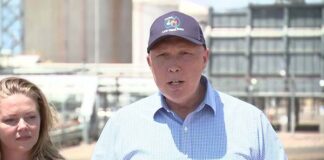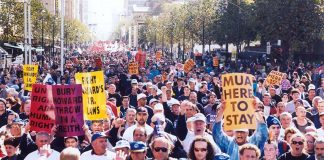Scott Morrison may have won the election. But his government has a very thin majority—and plenty of problems ahead.
Despite the Coalition’s election boast of “strong economic management”, almost as soon as the election was over the pitifully weak state of the Australian economy became clear.
In an effort to boost growth, the Reserve Bank has cut interest rates to a historic low of 1.25 per cent. They will likely go even lower.
New figures have shown the economy grew just 1.8 per cent in the last year—the slowest since the global economic crisis in 2009. On a per person basis, the economy has been in recession for almost a year. The retail sector is already clearly in recession, according to NAB. And things could get much worse if the trade war between the US and China accelerates.
The Liberals’ main priority when parliament returns is passing their tax cuts. They want to lock in changes between now and 2024 that overwhelmingly favour the rich.
The Liberals have also seized on the charges against CFMEU Victorian construction secretary John Setka in an effort to justify further anti-union laws. Setka should stand aside to demonstrate that the CFMEU takes the fight against sexism seriously. Not that the Liberals care about women’s rights, they are only interested in attacking a militant union.
Their new Ensuring Integrity Bill would allow the courts to ban anyone who breaches the law from being a union official and even de-register unions that breach industrial laws. This would give the government a further weapon to enforce the restrictions on legitimate strike action.
The Liberals’ remaining agenda is thin—but pressure from big business and the ruling class for new “economic reforms” to boost profits is piling up. And the Coalition’s hard right are agitating for further “religious freedom” laws to allow discrimination against LGBTI+ people as well as support for coal power stations.
Morrison won’t have it all his way. Despite improved numbers in the Senate, he will still need support from four crossbenchers to pass legislation.
Labor moves right
Instead of preparing to fight the Liberals, Labor is moving to the right in response to its shock election defeat.
New leader Anthony Albanese has joined the attack on John Setka, moving to expel him from the Labor Party.
And he has made it clear that the party’s tack to the left is over. Instead of taxing the rich he wants to court small business and shareholders, saying, “I want to appeal to people who are successful as well as lift people up who aren’t as successful.”
Albanese has even promoted himself as able to connect with conservative religious voters. In short Labor wants to become even more like the Liberals.
Kristina Keneally is doing her best to attack Peter Dutton from the right over refugees, saying he has “lost control of our borders” due to an increase in asylum seeker plane arrivals.
Labor has also moved to embrace coal and the Adani mine, with MPs including Joel Fitzgibbon and Shayne Neumann declaring they had to “listen to the voice” of regional Queenslanders who voted against it.
Queensland Labor Premier Annastacia Palaszczuk has responded to the election result by fast tracking Adani’s remaining environmental approvals.
The fact that Labor was seen as a threat to mining jobs did cost it votes. The lesson for the climate movement is that funding for new public sector jobs has to be at the centre of climate campaigning.
This is not the first time Labor has responded to defeat by shifting to the right and courting “aspirational” and wealthier voters. It drew the same conclusion after election defeats in 1998 and 2001.
But it’s not aspirational voters that Labor should be concerned about. It was lower paid workers who swung against Labor at the election, not the well-off. Moving to the right will only give workers even less reason to vote Labor.
The focus on door-knocking in marginal seats, by Getup and the union movement’s Change the Rules campaign, did not work to shift the election.
It is mobilisation and struggle through protests and industrial action that can shift society to the left and win change.
The refugee rights movement has called protests to mark six years of offshore detention on Manus and Nauru on 20 July—and oppose the repeal of the Medevac Law that allows refugees there to access medical treatment in Australia.
High school students have called another Strike for Climate on 20 September. This needs to have clear demands for climate jobs and a just transition for coal workers and communities on the front line of climate change and fossil fuel extraction. We need unions to join the climate protests—and to make it clear that the movement is serious about fighting for workers’ interests.
And above all we need a fighting union movement that is prepared to use its industrial muscle—and to break the law if necessary—to boost wages and workers’ rights.





